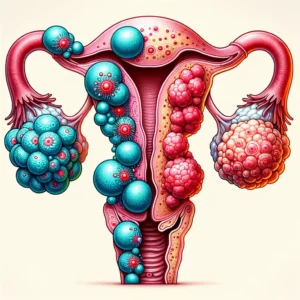Multiple uterine fibroids significantly impact women’s lives. This guide provides comprehensive information from definition, symptoms, diagnosis, to treatment options.
It aims to enhance understanding of multiple uterine fibroids, offering expert advice and real patient experiences to help women make informed health care decisions.
Multiple Uterine Fibroids?
Multiple uterine fibroids are benign tumors in the uterus, common among women. They can cause a range of symptoms or none at all, but their impact on a patient’s quality of life can be profound.

Common Early Symptoms
- Menstrual Changes: One of the earliest signs of uterine fibroids can be changes in menstrual patterns. This might include heavier than normal periods, periods that last longer than a week, or bleeding between periods.
- Pelvic Discomfort or Pain: While not all women with fibroids experience pain, some may feel a sense of fullness or pressure in the lower abdomen. In some cases, fibroids can cause acute pain, especially if they are undergoing a process known as degeneration.
- Frequent Urination: The pressure exerted by fibroids on the bladder can lead to frequent urination or an urgent need to urinate, even when the bladder is not full.
- Constipation or Bloating: Larger fibroids can press against the rectum, leading to constipation. They can also cause a general increase in waist size or a bloated feeling in the abdomen.
- Backache or Leg Pains: As fibroids grow, they can put pressure on the back and legs, leading to pain in these areas.

Causes and Diagnosis
The exact causes of multiple uterine fibroids remain unclear, though hormonal imbalances and genetic factors are suspected contributors. Diagnosis typically involves pelvic exams, ultrasound, or MRI scans.
Treatment Options
Treatments vary from medications and non-surgical methods to surgical options, tailored to the patient’s condition, symptom severity, and reproductive plans.
Pregnancy and Multiple Uterine Fibroids
Uterine fibroids can affect pregnancy. Women planning to conceive should consult with specialists to devise an appropriate treatment strategy.
Complications and Prevention
Complications may include anemia, acute pain, and uterine rupture. While no definitive prevention strategies exist, maintaining a healthy lifestyle can offer benefits.
Patient Experiences
Sharing real stories provides empathy and hope. These narratives highlight diverse symptoms, treatment journeys, and life changes, aiding understanding and management of the condition.
Conclusion: The Importance of Proactive Management
Early detection and active management are crucial for dealing with multiple uterine fibroids. Regular health screenings and consultations help patients find suitable treatments and minimize the condition’s impact. Maintaining a healthy lifestyle and seeking appropriate care can enhance life quality.
This guide aims to deepen understanding of multiple uterine fibroids and support patients in actively managing their health. Feel free to share your questions or experiences in the comments. Your insights can significantly aid others.
- Uterine Fibroids: An Overview of Current Management Options: https://www.ncbi.nlm.nih.gov/pmc/articles/PMC6448546/
Overcome Insomnia Naturally: 10 Proven Strategies for Better Sleep